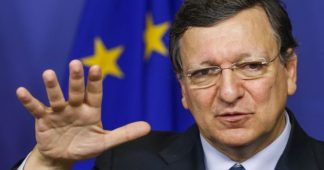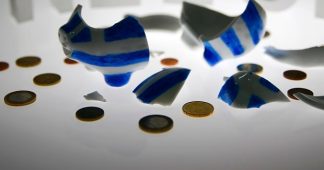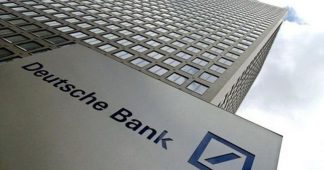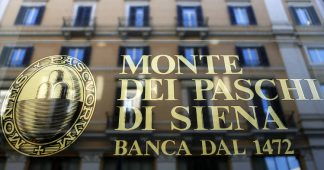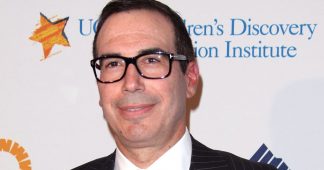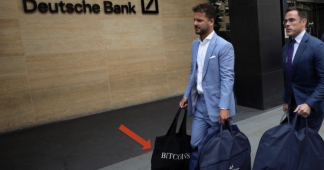by Tyler Durden
07/11/2019
When it rains inside the halls of Deutsche Bank, the flood is biblical.
Just when it seemed that the biggest (if not for long) German bank, already reeling from the biggest mass layoffs since Lehman, couldn’t possibly bear any more bad news, along comes the US government with yet another potentially criminal investigation, this time over Deutsche Bank’s involvement with the sprawling, multibillion-dollar Malaysian development fraud scandal that toppled a prime minister, crippled Goldman Sachs stock and stretched from Hollywood to Wall Street.
According to the WSJ, the DOJ is investigating whether the German bank violated foreign corruption or anti-money-laundering laws in its work for the 1Malaysia Development Bhd. fund, or 1MDB, which included helping the fund raise $1.2 billion in 2014 as concerns about the fund’s management and financials had begun to circulate.
So how did Deutsche Bank get thrown into yet another scandal? It turns out that DB was snitched out by former Goldman banker, Tim Leissner, the man who was ground zero in the original 1MDB scandal, and who ended up costing Goldman billions in dollar in market cap as its stock tumbled last year as its role in the biggest Malaysian corruption scandal got exposed, and according to some, cost Lloyd Blankfein his job. As it turns out, Leissner is now cooperating with authorities, and among his “good Samaritan” duties decided to throw the one bank that has more dirt on it than Goldman: Deutsche Bank. As we have reported extensively in the past, prosecutors have been investigating similar issues at Goldman, where Leissner, a former managing director, pleaded guilty last year and admitted to earlier helping siphon off billions of dollars from the fund.
For those who are unfamiliar, a quick rundown of events: 1MDB, a sovereign wealth fund, turned into a major global scandal after billions of dollars were drained from it between 2009 and 2014, leading to multiple government investigations and the downfall of former Malaysian Prime Minister Najib Razak who was especially close with former US president, Barak Obama.
The DOJ has said the stolen money totals at least $4.5 billion and that it was used to pay bribes to government officials, pad a slush fund controlled by the former prime minister and purchase hundreds of millions of dollars in luxury goods including jewelry, artwork and real estate.
So yes, one should have probably expected Deutsche Bank to be involved.
But what does Goldman, and Leissner, get in exchange? Apparently a settelment. From the WSJ:
Meanwhile, the Justice Department is set to begin negotiations with Goldman soon to try to resolve allegations through a possible criminal settlement, a senior official said. “We do anticipate getting into active discussions with Goldman, at this point, in the near future,” Assistant Attorney General Brian Benczkowski, who runs the agency’s criminal division, said in an interview. He declined to comment on any other aspect of the 1MDB investigation.
As the Journal further notes, prosecutors are focused, in particular, on the role of one of Leissner’s former colleagues, Tan Boon-Kee, who worked with Mr. Leissner on 1MDB-related business. She then left Goldman to become Asia Pacific head of banking for financial-institutions clients at Deutsche Bank, “where she was involved with further 1MDB dealings.”
Ms. Tan left Deutsche Bank last year, after the bank discovered communications between her and Jho Low, the Malaysian financier described by the Justice Department as the central player in the 1MDB scandal, according to a person familiar with her exit. Neither she nor the bank have commented publicly about the reason for her departure.
“Deutsche Bank has cooperated fully with all regulatory and law-enforcement agencies that have made inquiries relating to 1MDB,” a spokesman for the bank said. He cited Justice Department documents saying 1MDB made “material misrepresentations and omissions to Deutsche Bank officials” in connection with 1MDB’s transactions with the bank. “This is consistent with the bank’s own findings in this matter,” he added.
What is notable is that whereas Goldman Sachs received the most for its involvement in the 1MDB scandal and for helping the Malaysian fund raise $6.5 billion of bonds and the role of Leissner as a key co-conspirator in the scheme to steal money, the German bank had so far managed to avoid the spotlight.
But, as we now learn, Deutsche Bank, too, played a large role in a variety of transactions related to 1MDB. In fact, DB’s role may even be greater than that of Goldman: in the most recent version of the Justice Department’s civil asset-forfeiture complaint, in which it details the 1MDB scheme at length, Deutsche Bank is mentioned 167 times. Goldman Sachs is mentioned 56 times.
The complaint says Deutsche Bank was involved with 1MDB from its earliest days in 2009 as the bank facilitating financial transfers related to 1MDB’s first big deal, a joint venture with a little-known Swiss company called PetroSaudi. The Justice Department alleges that a group of conspirators led by Mr. Low, the Malaysian financier, stole some $1 billion from the $1.8 billion contribution by 1MDB, but it doesn’t describe any failing of Deutsche Bank in the complaint. PetroSaudi has denied any wrongdoing.
Deutsche Bank also arranged emergency loans for 1MDB in 2014 totaling $1.2 billion. The Justice Department said that money was also mostly stolen by Mr. Low and his co-conspirators. The bank called in the loan early, however, when it realized 1MDB’s collateral was impossible to verify, and 1MDB got an Abu Dhabi sovereign-wealth fund it often worked with to extend a $1 billion loan to replace Deutsche Bank, according to the complaint and Malaysian investigative documents.
The bottom line is that whereas Deutsche Bank probably did not engage in outright criminal fraud, its anti-money laundering process and “Know Your Client” protocols will be closely scrutinized, even if the banker(s) who were in charge of these activities are likely long gone.
But wait, there’s more!
Because roughly at the same time as DB’s potential role in the 1MDB scandal was exposed by the WSJ, both the NYT and Bloomberg reported that the German bank had extended relations with yet another, even more scandalous figure: Jeffrey Epstein.
According to NYT, Epstein “appears to have been doing business and trading currencies through Deutsche Bank until just a few months ago.” But as the possibility of federal charges loomed, the bank ended its client relationship with Epstein. It is not clear what the value of those accounts were at the time they were closed.
Bloomberg confirms, reporting that “Deutsche Bank severed business ties with Jeffrey Epstein earlier this year, just as federal authorities were preparing to charge the financier with operating a sex-trafficking ring of underage girls out of his opulent homes in Manhattan and Palm Beach.”
The German bank, itself a subject of unrelated government investigations, closed Epstein’s accounts over several months, according to a person familiar with the situation, who asked not to be identified discussing private matters.
It’s unclear how much money was involved or how long Epstein was a customer of Deutsche Bank, which maintained the accounts long after he was convicted of sex crimes more than a decade ago.
The fact that DB has a connection not only with president Trump, for which it has become the subject of numerous subpoenas, but also with the scandalous, if mysterious, Epstein, assures that even more attention will befall on Deutsche Bank. And speaking of Epstein’s mystery, Bloomberg reports that his Financial Trust Co. “had a $121 million investment in hedge fund firm DB Zwirn & Co., which shut down in 2008. Financial Trust also was also a major investor in Bear Stearns’s High-Grade Structured Credit Strategies Enhanced Leverage Fund, whose collapse helped ignite the global financial crisis.”
But back to Deutsche Bank, which after its biggest corporate restructuring announcement in decades, one which will see roughly one in five of its employees be terminated, it now appears that the Frankfurt-based bank will be in the spotlight for even more unpleasant reasons, likely assuring that thousands more of DB workers are summarily and quietly let go in the coming months, as the barrage of non-stop bad news makes one wonder: maybe it’s time for the bank to just turn off the lights…
Published at https://www.zerohedge.com/news/2019-07-10
